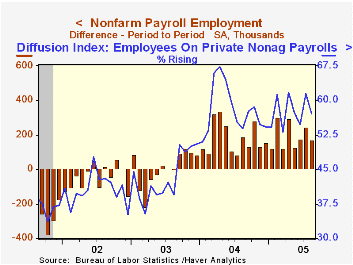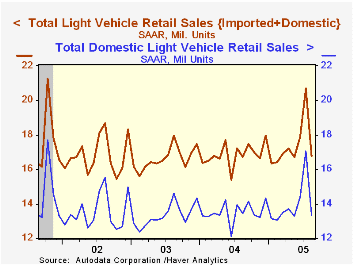 Global| Sep 02 2005
Global| Sep 02 2005Before Katrina, U.S. Payrolls On An Up Trend
by:Tom Moeller
|in:Economy in Brief
Summary
August non-farm payrolls rose 169,000. The gain was shy of Consensus expectations for a 190,000 increase but increases in both July and June were revised upward to 242,000 and 175,000, respectively. These job figures are the last [...]

August non-farm payrolls rose 169,000. The gain was shy of Consensus expectations for a 190,000 increase but increases in both July and June were revised upward to 242,000 and 175,000, respectively.
These job figures are the last before the devastating effects of Hurricane Katrina are tallied. Early estimates suggest that 500,000 to 750,000 workers will be absent from upcoming payroll counts.
Factory sector payrolls fell further in August by 14,000, higher than the 9,000 average loss during the last twelve months. A diffusion index measuring one month change in factory payrolls of 45.8% indicates that job losses were widespread amongst industries. The twelve month diffusion dropped to 33.3%, indicating that only one third of manufacturing establishments have added to job counts during that period.
Private service producing industries payrolls increased 141,000 (2.1% y/y) in August following an upwardly revised 198,000 July gain. Professional & business services jobs rose 29,000 (3.1% y/y), education & health services rose 43,000 (2.3% y/y) and financial jobs rose 15,000 (2.3% y/y). The one month diffusion index of 57.2% indicated that job creation was fairly broad amongst industry.
Construction jobs jumped 25,000 (4.0% y/y) while total government employment rose 15,000 (0.8% y/y).
The unemployment rate from the household survey dropped to 4.9%, a four year low as employment rose 373,000 (2.0% y/y) and the labor force rose 268,000 (1.5% y/y). The labor force participation rate rose to 66.2%, the highest since July 2004.
The index of aggregate hours worked (employment times hours worked) rose 0.1% (2.4% y/y) after an upwardly revised 0.3% rise in July. The first two months of the third quarter stood 0.4% above the second. Hours worked in 2Q increased 2.8% (AR) from 1Q05.
Average hourly earnings rose a slight 0.1%.
| Employment | Aug | July | Y/Y | 2004 | 2003 | 2002 |
|---|---|---|---|---|---|---|
| Payroll Employment | 169,000 | 242,000 | 1.7% | 1.1% | -0.3% | -1.1% |
| Manufacturing | -14,000 | -6,000 | -0.8% | -1.2% | -4.9% | -7.2% |
| Average Weekly Hours | 33.7 | 33.7 | 33.7 | 33.7 | 33.7 | 33.8 |
| Average Hourly Earnings | 0.1% | 0.4% | 2.7% | 2.1% | 2.7% | 2.9% |
| Unemployment Rate | 4.9% | 5.0% | 5.4% | 5.5% | 6.0% | 5.8% |
by Tom Moeller September 2, 2005

US sales of light vehicles slipped 19.0% m/m to 16.79M last month, according to the Autodata Corporation, as the allure of manufacturers' successful employee price discount programs faded
Sales of US made cars and trucks plummeted 21.8% m/m and fell 1.0% y/y. Truck sales fell nearly one third m/m (-5.0% y/y) and car sales fell 3.6% (+5.3% y/y).
Sales of imported cars & trucks also fell in August by 6.1% m/m (+6.2% y/y).
| Light Vehicle Sales (SAAR, Mil. Units) | Aug | July | Y/Y | 2004 | 2003 | 2002 |
|---|---|---|---|---|---|---|
| Total | 16.79 | 20.72 | 0.4% | 16.87 | 16.63 | 16.81 |
| Autos | 7.78 | 8.08 | 6.8% | 7.49 | 7.62 | 8.07 |
| Trucks | 9.01 | 12.65 | -4.6% | 9.37 | 9.01 | 8.74 |
Tom Moeller
AuthorMore in Author Profile »Prior to joining Haver Analytics in 2000, Mr. Moeller worked as the Economist at Chancellor Capital Management from 1985 to 1999. There, he developed comprehensive economic forecasts and interpreted economic data for equity and fixed income portfolio managers. Also at Chancellor, Mr. Moeller worked as an equity analyst and was responsible for researching and rating companies in the economically sensitive automobile and housing industries for investment in Chancellor’s equity portfolio. Prior to joining Chancellor, Mr. Moeller was an Economist at Citibank from 1979 to 1984. He also analyzed pricing behavior in the metals industry for the Council on Wage and Price Stability in Washington, D.C. In 1999, Mr. Moeller received the award for most accurate forecast from the Forecasters' Club of New York. From 1990 to 1992 he was President of the New York Association for Business Economists. Mr. Moeller earned an M.B.A. in Finance from Fordham University, where he graduated in 1987. He holds a Bachelor of Arts in Economics from George Washington University.
More Economy in Brief
 Global| Feb 05 2026
Global| Feb 05 2026Charts of the Week: Balanced Policy, Resilient Data and AI Narratives
by:Andrew Cates






